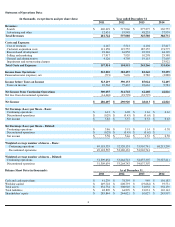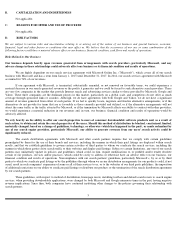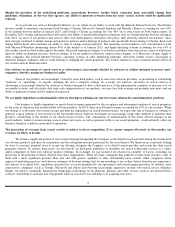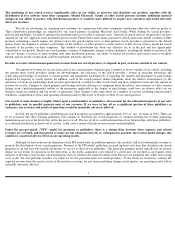Incredimail 2014 Annual Report Download - page 18
Download and view the complete annual report
Please find page 18 of the 2014 Incredimail annual report below. You can navigate through the pages in the report by either clicking on the pages listed below, or by using the keyword search tool below to find specific information within the annual report.
The mobile advertising market is relatively new and may develop or evolve not as currently expected, which could harm our mobile
marketing business.
The market for mobile advertising management solutions such as ours is relatively new and the solutions offered or being developed
may not achieve or sustain high levels of demand and market acceptance. Advertisers of mobile applications have historically spent a smaller
portion of their advertising budgets on mobile media as compared to traditional advertising methods, such as television, newspapers, radio and
billboards, or online advertising over the Internet, such as through banner ads on websites. Many advertisers of mobile applications still have
limited experience with mobile advertising and their utilization of this newer platform may evolve in a different fashion than currently expected.
In addition, our current and potential advertisers may ultimately find mobile advertising to be less effective than traditional advertising media or
marketing methods or other technologies for promoting their products and services, and may even reduce spending on mobile advertising from
current levels as a result. If the market for mobile advertising deteriorates, or develops in a different fashion than currently expected, we may not
be able to increase our revenue from our mobile marketing business.
The growth of our mobile marketing business will be impaired if mobile devices, their operating systems or content distribution
channels develop in ways that prevent our mobile marketing business's advertising campaigns from being delivered to their users.
Our mobile marketing business future business is dependent on the need of mobile application advertisers for assistance in managing
their advertising campaigns, including assistance in connecting such advertisers of mobile applications with advertising networks. If advertising
networks significantly open their platforms and make more data available to their advertisers, the importance of our ability to manage an ad
campaign and provide analytics would be diminished, potentially harming its revenues.
Our business depends on its ability to collect and use data to distribute ads, and any limitation on the collection and use of this data
could significantly diminish the value of our solutions and cause us to lose clients and revenue.
When we deliver an ad to a mobile device, we are often able to collect anonymous information about the placement of the ad and the
interaction of the mobile device user with the ad, such as whether the user clicked on the ad or watched a video. We may also be able to collect
information about the user's mobile location. As we collect and aggregate this data provided by billions of ad impressions, we analyze it in order
to optimize the placement and scheduling of ads across the advertising inventory provided to us by the advertising networks. For example, we
may use the collected information to limit the number of times a specific ad is presented to the same mobile device, to provide an ad to only
certain types of mobile devices, or to provide a report to an advertiser on the number of its ads that were clicked or watched.
Although the data we collect is not personally identifiable information, our clients might decide not to allow us to collect some or all of
this data or might limit our use of this data. For example, advertisers of mobile applications may not agree to provide us with the data generated
by interactions with the content on their apps, or device users may not consent to having information about their device usage provided to the
advertiser or through the to us through the advertiser. Additionally, our ability to either collect or use location-
based data could be restricted by a
number of factors, including new laws or regulations, technology, operating system restrictions or consumer choice. Any limitation on our
ability to collect data about user behavior and interaction with mobile device content could make it more difficult for us to deliver effective
mobile advertising that meet the demands of our advertisers of mobile applications.
Although our contracts with our advertisers of mobile applications generally permit us to aggregate data from advertising campaigns,
these advertisers of mobile applications might nonetheless request that we discontinue using data obtained from their campaigns that have
already been aggregated with other advertisers' campaign data. It would be difficult, if not impossible, to comply with these requests, and
responding to these kinds of requests could also cause us to spend significant amounts of resources. Interruptions, failures or defects in our data
collection, mining, analysis and storage systems, as well as privacy concerns and regulatory restrictions regarding the collection of data, could
also limit our ability to aggregate and analyze mobile device user data from our advertisers' advertising campaigns. If that happens, we may not
be able to optimize ad placement for the benefit of our advertisers, which could render our solutions less valuable, and, potentially result in loss
of clients and a decline in revenues.
•
lower levels of consumer spending on a per capita basis and fewer opportunities for growth in certain foreign market segments
compared to the United States;
•
lower levels of credit card usage and increased payment risk;
•
changes in domestic and international tax regulations; and
•
geopolitical events, including war and terrorism.
14
























